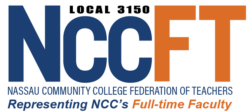In Candice Ferrette’s Newsday article last week about our presidential search, Trustee Cornachio is quoted as saying that he is “looking for someone who will bring stability and leadership to the college.” Everyone here, I am sure, would say the same thing, though I doubt we would all mean precisely the same thing when we said it. Still, I hope we could all agree on at least two things: first, that public education of the sort that Nassau Community College provides has been perhaps the single most effective democratizing force in the history of the United States and, second, that any vision for the future of this college that does not include nurturing that aspect of what do is not a vision worth pursuing.
The national trend in higher education of relying more and more on contingent teaching faculty directly undermines that kind of vision. Not because contingent faculty are not committed teachers and scholars—they are. Not because they do not care about the institutions where they teach or have nothing to offer outside the classroom—they do. But because their contingency leaves them beholden to the vagaries of the bottom line and/or the changing needs of administrators, neither of which is necessarily congruent with the democratic vision of education I described above.
Those who advocate for this greater reliance on contingent faulty justify it as a response to precisely the kinds of funding and budget problems that NCC is facing; but that is the response of a corporate executive, one that values the bottom line and productivity over the quintessentially non-corporate goal of nurturing engaged, committed, curious and therefore more than merely employable citizens. Indeed, the degree to which public higher education has been successful at democratizing this nation can be linked directly to people like us, full-time faculty, expensive as we are, who commit our professional lives to the idea that eduction, far from being a contingent activity, is a force for the social good, and that institutions of higher education are responsible and accountable for the quality and integrity with which they pursue that good.
Nassau Community College does not have to follow the national trend. We can choose a president who sees full-time faculty not as a set of numbers skewing the bottom line into the red, not as a nuisance that gets in the way of greater efficiency and productivity, but as the institution’s front line in preserving and fulfilling its mission. Our new president will still have some very difficult financial decisions to make, but if those decisions are shaped by a shared vision of the role that public higher education plays, then our inevitable disagreements will end up making this institution stronger rather than threatening to tear it apart.
